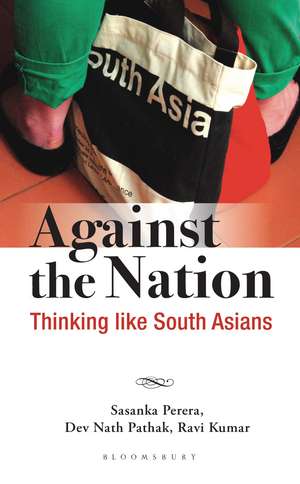Against the Nation: Thinking Like South Asians
Autor Sasanka Perera, Dev Nath Pathak, Ravi Kumaren Limba Engleză Hardback – 17 iul 2019
Preț: 507.09 lei
Preț vechi: 729.24 lei
-30% Nou
Puncte Express: 761
Preț estimativ în valută:
97.03€ • 101.60$ • 80.48£
97.03€ • 101.60$ • 80.48£
Carte disponibilă
Livrare economică 20 martie-03 aprilie
Preluare comenzi: 021 569.72.76
Specificații
ISBN-13: 9789388630238
ISBN-10: 9388630238
Pagini: 280
Dimensiuni: 135 x 216 mm
Greutate: 0.32 kg
Editura: Bloomsbury Publishing
Colecția Bloomsbury Academic India
Locul publicării:New Delhi, India
ISBN-10: 9388630238
Pagini: 280
Dimensiuni: 135 x 216 mm
Greutate: 0.32 kg
Editura: Bloomsbury Publishing
Colecția Bloomsbury Academic India
Locul publicării:New Delhi, India
Caracteristici
Against the Nation takes the idea of South Asia to a more thoughtful and reflective plain.
Notă biografică
Sasanka Perera teaches Sociology at South Asian University and is the founding professor of the university's Department of Sociology. He has researched on the thematic issues of contemporary visual art in Sri Lanka, violence and memory, religion and politics. He is the Editor of Society and Culture in South Asia. Some of his recent publications include Warzone Tourism in Sri Lanka: Tales from Darker Places in Paradise(2016), Violence and the Burden of Memory (2015), Culture and Politics in South Asia: Performative Communication (co-edited, 2018) and Sociology and Social Anthropology in South Asia: Histories and Practices (co-edited, 2018). Dev Nath Pathak teaches Sociology at South Asian University and is a founding faculty member of the university's Department of Sociology. His current research interests include popular culture (music, cinema and performance) and South Asian studies. He is Reviews Editor of Society and Culture in South Asia (the journal of Department of Sociology, South Asian University, co-published with SAGE India). Some of his recent publications include Living & Dying: Meanings in Maithili Folklore (2018), Another South Asia! (2018), Culture and Politics in South Asia: Performative Communication (co-edited, 2017) and Sociology and Social Anthropology in South Asia: Histories and Practices (co-edited, 2018). Ravi Kumar teaches Sociology at South Asian University and is a founding faculty member of the university's Department of Sociology. He is also Associate Editor of Society and Culture in South Asia and serves on the editorial board of The Journal of Critical Education Policy Studies and Critical Education. Some of his recent publications include Contemporary Readings in Marxism: A Critical Introduction (2016), Neoliberalism, Critical Pedagogy and Education (2016), Social Movements: Transformative Shifts and Turning Points (2014), Education and the Reproduction of Capital: Neoliberal Knowledge and Counterstrategies (2012) and Sociology and Social Anthropology in South Asia: Histories and Practices (co-edited, 2018).
Cuprins
Preface and AcknowledgementsBeginnings: Against the Nation and Thinking Like South AsiansI. 'Official' Imaginings of South Asia and Its Contradictions 1. SAARC Setbacks and Thinking beyond the Boundaries of Its Nation States2. Seeing Like South Asians: Moving beyond Narrow National Frames3. The Idea of South Asia: Beyond the Intellectual Dependence on the Statist Perspective4. Anxieties of SAARC: An Experiential Reading through South Asian University5. South Asia: Between Dream and Actuality II. 'Unofficial' Reimagining of South Asia 6. Beyond History, against the Present: Preliminary Thoughts on Reimagining 'South Asia'7. An Emotive-Intellectual Inclination to another South Asia!8. Localising South Asia, Theoretically 9. 'South Asia' as an Idea and a Problem of Modernity III. Towards a South Asian Knowledge System 10. In Defence of 'Area Studies' in South Asia 11. Reclaiming Social Sciences and Humanities: Notes from South Asia12. Anthropological South Asia: Thinking through Utopias Amidst Intellectual Hegemonies13. Universities, Classrooms and Intellectuals: The Struggle to Create a South Asian Knowledge System 14. Buddhist Categories, Contemporary World and Sociology: Incomplete Thoughts towards Possibilities of Social Theory and Modes of Thinking in South Asia 15. Bringing the Thinking of Jiddu Krishnamurti into Politics 16. Thinking of Myth and Folklore in the Twenty-first Century IV. South Asia in Popular Politics 17. Online South Asia and Its Mediated Politics 18. A Melodramatic South Asia: Perusing a Performative-scape 19. In the Frame of the Popular Cinema Despite the Hegemony of Hindi 20. The Sound of Silence: Of the Shrinking Public Sphere in South Asia 21. Reformulating South Asia: Artists' Travels and Possibilities of a New Cartography22. The Cultural Politics of Hatred in South Asia Index About the Authors
Recenzii
Perera, Pathak and Kumar have rescued the idea of South Asia from its statist straitjacket and infused it with new and rich cultural meaning...
This volume represents the first serious attempt to move beyond an artificial and policy-driven definition of South Asia. The authors have lent it a strategic and historical weight that points toward a new kind of future for its peoples.
Weaving together myth, folklore, art and politics, this volume views the region from the perspective of an experiment in transnational cooperation-the South Asian University.
This volume is an unconventional and bold attempt at revisiting and reimagining South Asia in all its diverse perspectives. The attempt is timely and refreshing. It will intellectually stimulate and empower the readers at the same time.
This book will interest both proponents and sceptics of South Asia, not only in understanding or inversely nullifying the viability of South Asianness in the future but also in flagging its strength and weaknesses in the past.
This volume represents the first serious attempt to move beyond an artificial and policy-driven definition of South Asia. The authors have lent it a strategic and historical weight that points toward a new kind of future for its peoples.
Weaving together myth, folklore, art and politics, this volume views the region from the perspective of an experiment in transnational cooperation-the South Asian University.
This volume is an unconventional and bold attempt at revisiting and reimagining South Asia in all its diverse perspectives. The attempt is timely and refreshing. It will intellectually stimulate and empower the readers at the same time.
This book will interest both proponents and sceptics of South Asia, not only in understanding or inversely nullifying the viability of South Asianness in the future but also in flagging its strength and weaknesses in the past.
